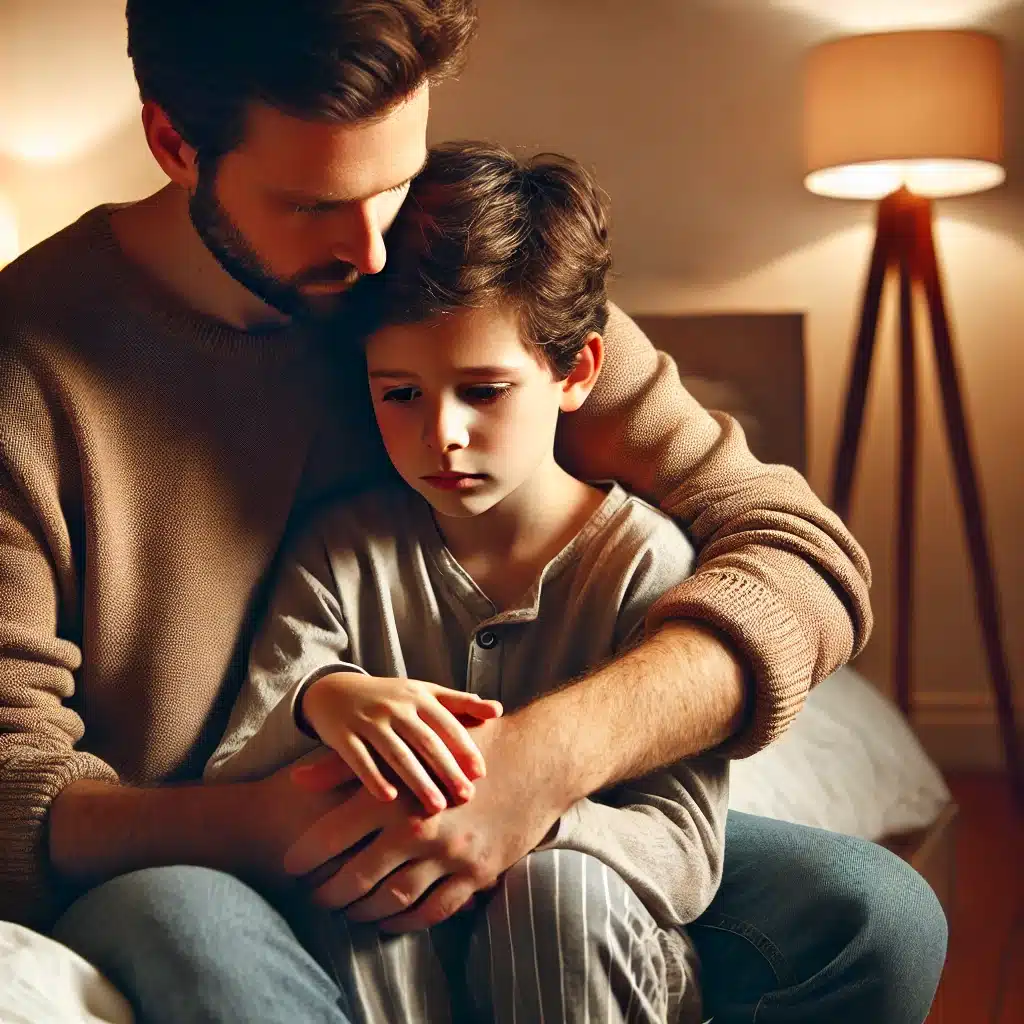Table of Contents
- What Is Bedwetting Really?
- The Sleep Connection
- Hidden Mental Health Effects
- Academic and Social Impact
- The ADHD Misdiagnosis Problem
- Physical Signs You Might Miss
- Self-Esteem and Emotional Damage
- Long-Term Life Effects
- Family Impact
- Getting Real Help
- Frequently Asked Questions
What Is Bedwetting Really?
As a licensed psychologist at a Bedwetting Treatment Center, I work with families who think bedwetting is just a bladder problem. They’re wrong. Bedwetting is actually a sleep disorder caused by an inherited gene.
This gene disrupts normal communication between the brain and bladder. The result? Your child sleeps too deeply to wake up for the bathroom or stay asleep while holding urine until morning.
How deep do bedwetters sleep? They sleep through smoke alarms, storms, and even falling out of bed. One teen patient fell from a top bunk and stayed asleep on the floor. This isn’t normal sleep.
The Sleep Connection
Why Sleep Matters for Bedwetting
Bedwetting happens because of disordered sleep patterns. Children with bedwetting miss out on healthy sleep cycles every night. This creates a chain reaction of problems that most parents never connect to wet beds.
The Science Behind Deep Sleep
Normal sleepers cycle through different sleep stages. Bedwetters get stuck in the deepest stage. They can’t wake up when their bladder sends signals to their brain. This same deep sleep causes many other hidden problems.
Hidden Mental Health Effects
Daily Mood Problems
Children with bedwetting face mood regulation issues because of poor sleep quality. Here’s what I see in my practice:
- Morning grogginess that lasts for hours
- Irritability throughout the day
- Anxiety about bedtime and sleepovers
- Depression symptoms from shame and tiredness
- Emotional outbursts over small problems
The Anxiety Cycle
Bedwetting creates anxiety, which makes sleep worse, which makes bedwetting worse. Children worry about:
- Wetting the bed again
- Parents finding out
- Sleepovers and overnight trips
- What friends might think
This anxiety keeps their minds active at bedtime, making healthy sleep even harder to achieve.
Academic and Social Impact
School Performance Issues
Poor sleep from bedwetting affects learning in several ways:
Attention Problems
- Trouble focusing during lessons
- Missing important information
- Difficulty completing tasks
Memory Issues
- Forgetting homework assignments
- Problems remembering what they learned
- Struggling with test preparation
Behavioral Challenges
- Falling asleep in class
- Acting out from frustration
- Avoiding participation
Social Consequences of Bedwetting
Bedwetting limits social activities. Children often:
- Skip sleepovers with friends
- Avoid overnight camps
- Feel embarrassed around peers
- Develop fewer close friendships
These missed experiences can affect social development for years.
The ADHD Misdiagnosis Problem
When Bedwetting Looks Like ADHD
Many children with bedwetting get diagnosed with ADHD by mistake. Sleep deprivation from bedwetting causes symptoms that look like ADHD:
- Can’t sit still or focus
- Hyperactive behavior
- Impulsive actions
- Trouble following directions
The Testing Gap
ADHD tests don’t ask about bedwetting. Doctors miss the sleep connection. They see the symptoms but not the real cause.
Our clinic data shows: 9 out of 10 patients see ADHD symptoms improve after bedwetting treatment. This suggests many ADHD diagnoses might actually be sleep problems from bedwetting.
Physical Signs You Might Miss
Energy Problems Throughout the Day
Bedwetting affects energy in different ways:
Low Energy Signs:
- Needing naps after school
- Falling asleep in the car
- Moving slowly in the morning
- Complaining about being tired
High Energy Signs:
- Hyperactive behavior from adrenaline
- Crashing hard at bedtime
- Running on nervous energy
- Unable to calm down easily
Health Problems from Poor Sleep
Chronic sleep issues from bedwetting can cause:
- Frequent headaches
- Stomach problems
- Getting sick more often
- Slower healing from injuries
Self-Esteem and Emotional Damage
The Shame Factor
Bedwetting creates deep shame, especially when:
- Younger siblings stay dry
- Friends talk about sleepovers
- Parents seem frustrated
- The child feels “babyish”
Building Negative Self-Image
Over time, children with bedwetting start to believe:
- They’re different from other kids
- Something is wrong with them
- They can’t control their bodies
- They’re disappointing their parents
This negative thinking can last into adulthood if bedwetting isn’t treated properly.
Long-Term Life Effects
Missing Life Experiences
Bedwetting limits childhood experiences:
- Elementary years: No sleepovers with friends
- Middle school: Skipping overnight field trips
- High school: Avoiding school trips and camps
- College: Fear of dorm living
Adult Consequences of Bedwetting
Adults who never got proper bedwetting treatment often struggle with:
- Relationship problems
- Travel anxiety
- Career limitations
- Ongoing shame and secrecy
Our oldest patient was 39 years old. He avoided marriage his whole life because of bedwetting.
Family Impact
Stress on Parents
Parents of children with bedwetting experience:
- Frustration from failed solutions
- Worry about their child’s future
- Guilt about genetic inheritance
- Financial stress from products and treatments
Effects on Siblings
Brothers and sisters are affected too:
- Disrupted sleep from nighttime changes
- Confusion about why their sibling wets the bed
- Sometimes guilt for staying dry
- Family activities limited by bedwetting needs
Relationship Strain
Bedwetting can create tension between:
- Parents disagreeing on treatment approaches
- Child and parents over shame and blame
- Siblings over different bedtime rules
- Extended family who don’t understand
Getting Real Help
What Doesn’t Work
Many families try these approaches without success:
- Limiting fluids before bed
- Waking the child at night
- Punishment or rewards
- Bedwetting alarms from stores
- Medication alone
What Actually Works
Effective bedwetting treatment must:
- Address the sleep disorder directly
- Provide expert coaching and support
- Include emotional and psychological help
- Be tailored to each individual case
- Focus on long-term results, not quick fixes
The Holistic Approach
At our clinic, we treat the whole person, not just the bedwetting. This includes:
- Correcting disordered sleep patterns
- Building self-esteem and confidence
- Teaching coping strategies
- Supporting the entire family
- Providing ongoing guidance and care
Frequently Asked Questions
Is bedwetting really a sleep disorder?
Yes, bedwetting is caused by an inherited gene that creates abnormally deep sleep. This prevents the brain from responding to bladder signals during the night.
Will my child outgrow bedwetting naturally?
Some children stop bedwetting on their own, but most don’t. Waiting can mean years of missed experiences and emotional damage. Treatment can end bedwetting much faster.
Does bedwetting cause ADHD?
Bedwetting doesn’t cause ADHD, but the sleep problems from bedwetting can create symptoms that look like ADHD. Many children see these symptoms improve after proper bedwetting treatment.
How does bedwetting affect school performance?
Poor sleep from bedwetting makes it hard to focus, remember information, and control behavior at school. Children may struggle academically not because they can’t learn, but because they’re too tired to learn well.
Can adults get bedwetting treatment too?
Yes, adults can be successfully treated for bedwetting. We regularly work with teenagers preparing for college and adults who have lived with bedwetting their whole lives.
How long does bedwetting treatment take?
Treatment length varies by individual, but most people see improvement within weeks to months. The key is working with experts who understand the sleep disorder causing bedwetting.
Will treating bedwetting help with mood problems?
Many families report improvements in mood, behavior, and emotional regulation after successful bedwetting treatment. Better sleep helps with overall mental health and well-being.
Is bedwetting treatment covered by insurance?
Coverage varies by insurance plan. Many families find that the long-term benefits of treatment – including improved mental health, academic performance, and quality of life – make it a worthwhile investment regardless of insurance coverage.



